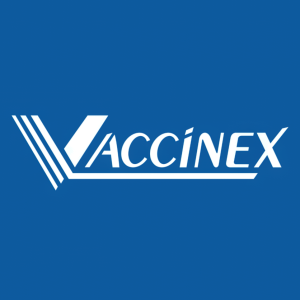Vaccinex Reports Second Quarter 2023 Financial Results and Provides Corporate Update
Phase 1/2a SIGNAL-AD Study of Pepinemab in Alzheimer’s Disease Achieves Full Accrual
Expect to Complete 12-months treatment in June, 2024
Promising Interim Results for KEYNOTE-B84 Phase 2 Trial in Head and Neck Cancer
ROCHESTER, N.Y., Aug. 14, 2023 (GLOBE NEWSWIRE) -- Vaccinex, Inc. (Nasdaq: VCNX), a clinical-stage biotechnology company pioneering a differentiated approach to treating neurodegenerative disease and cancer through the inhibition of SEMA4D, today announced financial results for the second quarter ended June 30, 2023 and provided a corporate update on progress in key programs. .
Over the last few months, Vaccinex achieved several important clinical milestones for pepinemab in both Alzheimer’s disease and Head and Neck Cancer.
Alzheimer’s Disease (AD):
- Completed enrollment in the randomized, double-blind, Phase 1b/2 SIGNAL-AD trial of pepinemab in patients with mild Alzheimer’s disease (NCT04381468), funded in part by the Alzheimer’s Drug Discovery Foundation and by a grant from the Alzheimer’s Association.
- Anticipate completing 12-months treatment in June, 2024 at which time we will evaluate the impact of treatment on brain metabolic activity, a key biomarker of clinical progression in AD, as well as treatment effects on cognition employing several validated, clinically meaningful Alzheimer’s cognitive scales.
- An improving AD-drug development environment, based on FDA’s recent full approval of LEQEMBI®, enables the pathway to reimbursement and supports further investment in Alzheimer’s Disease drug development.
- As previously reported, pepinemab has a differentiated mechanism of action, blocking SEMA4D, which is upregulated in neurons during stress of Alzheimer’s and Huntington’s disease and triggers the transformation of astrocytes and microglia from normal homeostatic functions to neuroinflammatory activity. Blockade of SEMA4D restores healthy astrocyte and neuronal functions while reducing neuroinflammation (Nature Medicine 2022).
Head and Neck Cancer:
- Analyzed interim data from the first 36 patients in the single-arm, Phase 2 KEYNOTE B-84 study (NCT04815720) evaluating pepinemab in combination with KEYTRUDA™ in immunotherapy naïve patients with recurrent or metastatic head and neck squamous cell carcinoma (HNSCC).
- The combination of pepinemab and KEYTRUDA™ resulted in an approximately 2X increase in objective responses (ORR) and progression free survival (PFS) in patients with hard-to-treat PD-L1-low tumors compared to historical response rates for checkpoint monotherapy in this population.
- Biomarker data suggest that treatment induced the formation of highly organized lymphoid aggregates in tumor that correlate with disease control and have previously been shown to be important for response to checkpoint inhibitors.
- Vaccinex and Merck are currently in the design stages for an expansion of the KEYNOTE-B84 study that may extend benefits to more patients.
Investors and stakeholders will recall that the design and motivation for this study grew out of very encouraging data from our completed phase 2 SIGNAL study of pepinemab in Huntington’s disease (Nature Medicine 2022) that demonstrated treatment-induced increase in brain metabolic activity and improved cognition in patients with early manifest HD. The known parallels in pathology between Huntington’s and Alzheimer’s disease and the successful outcomes already observed for pepinemab in HD suggest that these may be predictive of similar outcomes in AD. It is noteworthy that pepinemab has a very different mechanism of action in AD than do antibodies to Aβ amyloid and that, to date, pepinemab has shown no evidence of ARIA, which is associated with amyloid-targeted therapies (e,g., Leqembi or donanemab). Pepinemab could be developed as an alternative treatment for AD, or, potentially, in combination with an anti-Aβ for greater efficacy.
In cancer, pepinemab is best employed in combination with an immune checkpoint inhibitor (ICI) such as KEYTRUDA. We are, therefore, pleased to have initiated two additional clinical studies with pepinemab in combination with another ICI in metastatic pancreatic cancer (PDAC) at the University of Rochester and in combination with a cell-based immunotherapy for breast cancer (MBC) at the Moffitt Cancer Center. Continuing progress and expanding interest in these studies affirms our view that pepinemab has the potential to improve outcomes for patients with different serious diseases and highlights the growing compendium of promising clinical data for pepinemab.
Recent Milestones and News
- ASCO Presentations: Vaccinex and its collaborators presented two posters in the “Trial in Progress” sessions at the American Society for Clinical Oncology in June 2023 (ASCO23):
- Phase 1b/2 PDAC Study: The team from University of Rochester Cancer Center and Wilmot Cancer Institute presented the plan for the single-arm, open-label study to evaluate pepinemab in combination with BAVENCIO® (avelumab) as second line combination immunotherapy for patients with metastatic pancreatic ductal adenocarcinoma (PDAC, TPS4195, NCT05102721). The Vaccinex-sponsored study will employ a Bayesian Optimal Interval (BOIN) Design in the Phase 1b segment and a Simon two stage assessment in the Phase 2 segment and is expected to enroll 40 subjects. The trial rationale builds on safety and efficacy of the CLASSICAL-Lung study of pepinemab and avelumab in lung cancer and the observation that pepinemab appears to modulate the TME by increasing effector cell infiltration and reducing immune suppression in the TME, rendering “cold” tumors such as PDAC to become “hot”. The study is being conducted with grant support from the Gateway Discovery Award.
- Phase 1 Metastatic Breast Cancer Study: The team from the Moffitt Cancer Center presented the plan for an open-label, Phase I study to evaluate up to 28 patients with HER2+ metastatic breast cancer (MBC, TPS1113, NCT05378464). Patients will receive a combination of dendritic cell vaccines (DC1) plus trastuzumab (an anti-HER-2 antibody) and pepinemab, together with adoptive CD4+ T cell therapy. . The study rationale is supported by preclinical and clinical studies suggesting that pepinemab enhances the activity of dendritic cells to organize B cells and CD4+ T cells into productive lymphoid aggregates and boost anti-tumor immunity in cancers like MBC that are resistant to ICI therapies.
Huntington’s Disease:
- Following an in-depth analysis of the Phase 2 SIGNAL-HD trial, Vaccinex is evaluating its HD development strategy, including further clinical studies and potential partnering discussions. The Company has an ongoing discussion with the FDA regarding the design of a potential Phase 3 trial. Further updates to be provided as we receive clarification from FDA.
ActivMAb® Platform Technology:
- The first clinical candidate selected through use of this technology (SRF114, a fully human monoclonal antibody targeting CCR8 for the potential treatment of solid tumors), is in a Phase 1/2 study sponsored by our licensee, Surface Oncology, recently acquired by Coherus Biosciences, Inc. (transaction announced June 16, 2023 and expected to close in Q3 2023). The technology and its potential applications for drug discovery against complex membrane protein targets including the “hard to drug” class of membrane-associated G protein-coupled receptors (GPCRs) and ion channels have been described in several publications and has also been utilized in multiple antibody discovery collaborations with leading biopharmaceutical companies.
Financial Results for the Three Months Ended June 30, 2023:
Cash and Cash Equivalents and Marketable Securities. Cash and cash equivalents and marketable securities on June 30, 2023 were
Financing activities in Q2 2023 included financing of
In addition, on May 16, 2023, in connection with the second installment of the Alzheimer’s Drug Discovery Foundation (ADDF) Award, Vaccinex sold approximately 2.5 million shares at a purchase price of
Research and Development Expenses. Research and development expenses for the quarter ended June 30, 2023 were
The increase in research and development expenses is primarily attributable to increased patient enrollment in the SIGNAL-AD study and the Phase 1b/2 KEYNOTE B84 study in HNSCC.
General and Administrative Expenses. General and administrative expenses for the quarter ended June 30, 2023 were
The nominal increase in general and administrative expenses reflects careful cost control measures.
Comprehensive loss/Net loss per share. The Comprehensive Loss and Net loss per share for the quarter ended June 30, 2023 was
Full financial tables are included below. For further details on Vaccinex’s financials, refer to its Form 10Q filed August 14, 2023 with the S.E.C.
Vaccinex has global commercial and development rights to pepinemab and is the sponsor of the KEYNOTE-B84 study which is being performed in collaboration with Merck Sharp & Dohme Corp, a subsidiary of Merck and Co, Inc. Kenilworth, NJ, USA. Additional information about the study is available at: clinicaltrials.gov.
KEYTRUDA is a registered trademark of Merck Sharp & Dohme Corp., a subsidiary of Merck & Co. Inc., Kenilworth, NJ, USA.
BAVENCIO®/avelumab is co-developed and co-commercialized by Merck KGaA, Darmstadt, Germany and Pfizer Inc.
About Pepinemab
Pepinemab is a humanized IgG4 monoclonal antibody. It inhibits SEMA4D which regulates the actin cytoskeleton of cells and plays an important role in tumor immune evasion as well as in inflammatory reactions in the brain. Preclinical and clinical data show that pepinemab promotes infiltration and activation of dendritic cells and CD8+ T cells and reverses immunosuppression within the tumor microenvironment. Separately, studies in neurodegenerative disease show that by preventing deleterious inflammatory gliosis during disease progression, pepinemab preserves normal function of astrocytes and microglia, two types of glial cells that play a crucial role in the function and health of neurons in the brain. Pepinemab is being evaluated in several studies in neurodegenerative disease and cancer. Pepinemab has been administered to more than 400 patients and appears to have a favorable safety and tolerability profile.
About Vaccinex Inc.
Vaccinex, Inc. is pioneering a differentiated approach to treating slowly progressive neurodegenerative diseases and cancer through the inhibition of semaphorin 4D (SEMA4D). The Company’s lead drug candidate, pepinemab, blocks SEMA4D, a potent biological effector that it believes triggers damaging inflammation in chronic diseases of the brain and prevents immune infiltration into tumors. In neurodegenerative diseases, pepinemab is being studied as a monotherapy in the Phase 1/2a SIGNAL-AD study in Alzheimer’s Disease, with ongoing exploration of potential Phase 3 development in Huntington’s disease. In oncology, pepinemab is being evaluated in combination with KEYTRUDA® in the Phase 1b/2 KEYNOTE-B84 study in recurrent or metastatic head and neck cancer (HNSCC) and in combination with BAVENCIO® in a Phase 1b/2 study in patients with metastatic pancreatic adenocarcinoma (PDAC). The oncology clinical program also includes several investigator-sponsored studies in solid tumors including breast cancer and melanoma.
Forward Looking Statements
To the extent that statements contained in this presentation are not descriptions of historical facts regarding Vaccinex, Inc. (“Vaccinex,” “we,” “us,” or “our”), they are forward-looking statements reflecting management’s current beliefs and expectations. Such statements include, but are not limited to, statements about our plans, expectations and objectives with respect to the results and timing of the KEYNOTE-B84 clinical trial, planned interim analysis, the use and potential benefits of pepinemab in R/M HNSCC, lung cancer, metastatic pancreatic adenocarcinoma (PDAC) and other indications, the potential for benefits as compared to single agent KEYTRUDA® or BAVENCIO®, expectations with respect to the collaboration of Merck, expectations and objectives with respect to the results and timing of the SIGNAL-AD clinical trial, the potential to initiate a Phase 3 trial in HD and any impact from ongoing FDA discussions, the expected timeline for disclosure of trial results at scientific conferences or through publications, and other statements identified by words such as “believes,” “being,” “may,” “will,” “appears,” “expect,” “continue,” “estimate,” “ongoing,” “potential,” “prevents,” “suggest”, and similar expressions or their negatives (as well as other words and expressions referencing future events, conditions, or circumstances). Forward-looking statements involve substantial risks and uncertainties that could cause the outcome of our research and pre-clinical development programs, clinical development programs, future results, performance, or achievements to differ significantly from those expressed or implied by the forward-looking statements. Such risks and uncertainties include, among others, uncertainties inherent in the execution, cost and completion of preclinical studies and clinical trials, that interim and preliminary data may not be predictive of final results and does not ensure success in later clinical trials, uncertainties related to regulatory approval, risks related to our dependence on our lead product candidate pepinemab, the impact of the COVID-19 pandemic, the possible delisting of our common stock from NASDAQ if we are unable to regain compliance with the NASDAQ listing standards, and other matters that could affect our development plans or the commercial potential of our product candidates. Except as required by law, we assume no obligation to update these forward-looking statements. For a further discussion of these and other factors that could cause future results to differ materially from any forward-looking statement, see the section titled “Risk Factors” in our periodic reports filed with the Securities and Exchange Commission (“SEC”) and the other risks and uncertainties described in the Company’s annual year-end Form 10-K and subsequent filings with the SEC. .
Investor Contact
John Mullaly
LifeSci Advisors, LLC
617-429-3548
jmullaly@lifesciadvisors.com
VACCINEX, INC.
Condensed Consolidated Balance Sheets (Unaudited)
(in thousands, except share and per share data)
| As of June 30, 2023 | As of December 31, 2022 | |||||||
| ASSETS | ||||||||
| Current assets: | ||||||||
| Cash and cash equivalents | $ | 1,908 | $ | 6,391 | ||||
| Accounts receivable | 11 | 175 | ||||||
| Prepaid expenses and other current assets | 760 | 912 | ||||||
| Total current assets | 2,679 | 7,478 | ||||||
| Property and equipment, net | 177 | 189 | ||||||
| Operating lease right-of-use asset | 229 | 310 | ||||||
| TOTAL ASSETS | $ | 3,085 | $ | 7,977 | ||||
| LIABILITIES AND STOCKHOLDERS’ EQUITY | ||||||||
| Current liabilities: | ||||||||
| Accounts payable | $ | 1,608 | $ | 1,518 | ||||
| Accrued expenses | 1,533 | 781 | ||||||
| Current portion of long-term debt | 75 | 74 | ||||||
| Operating lease liability | 167 | 164 | ||||||
| Total current liabilities | 3,383 | 2,537 | ||||||
| Long-term debt | 63 | 101 | ||||||
| Operating lease liability, net of current portion | 62 | 146 | ||||||
| TOTAL LIABILITIES | 3,508 | 2,784 | ||||||
| Commitments and contingencies (Note 6) | ||||||||
| Stockholders’ equity (deficit): | ||||||||
| Common stock, par value of | 7 | 5 | ||||||
| Additional paid-in capital | 331,279 | 324,875 | ||||||
| Treasury stock, at cost; 852 shares of common stock as of June 30, 2023 and December 31, 2022, respectively | (11 | ) | (11 | ) | ||||
| Accumulated deficit | (331,698 | ) | (319,676 | ) | ||||
| TOTAL STOCKHOLDERS’ EQUITY | (423 | ) | 5,193 | |||||
| TOTAL LIABILITIES AND STOCKHOLDERS’ EQUITY | $ | 3,085 | $ | 7,977 | ||||
The accompanying notes are an integral part of these condensed consolidated financial statements.
VACCINEX, INC.
Condensed Consolidated Statements of Operations and Comprehensive Loss (Unaudited)
(in thousands, except share and per share data)
| Three Months Ended June 30, | Six Months Ended June 30, | |||||||||||||||
| 2023 | 2022 | 2023 | 2022 | |||||||||||||
| Revenue | $ | - | $ | - | $ | 550 | $ | - | ||||||||
| Costs and expenses: | ||||||||||||||||
| Research and development | 5,050 | 3,843 | 8,862 | 6,809 | ||||||||||||
| General and administrative | 2,027 | 1,558 | 3,751 | 3,186 | ||||||||||||
| Total costs and expenses | 7,077 | 5,401 | 12,613 | 9,995 | ||||||||||||
| Loss from operations | (7,077 | ) | (5,401 | ) | (12,063 | ) | (9,995 | ) | ||||||||
| Interest expense | - | (1 | ) | (1 | ) | (2 | ) | |||||||||
| Other income (expense), net | 17 | 19 | 42 | 19 | ||||||||||||
| Loss before provision for income taxes | (7,060 | ) | (5,383 | ) | (12,022 | ) | (9,978 | ) | ||||||||
| Provision for income taxes | - | - | - | - | ||||||||||||
| Net loss attributable to Vaccinex, Inc. common stockholders | $ | (7,060 | ) | $ | (5,383 | ) | $ | (12,022 | ) | $ | (9,978 | ) | ||||
| Comprehensive loss | $ | (7,060 | ) | $ | (5,383 | ) | $ | (12,022 | ) | $ | (9,978 | ) | ||||
| Net loss per share attributable to Vaccinex, Inc. common stockholders, basic and diluted | $ | (0.12 | ) | $ | (0.13 | ) | $ | (0.22 | ) | $ | (0.25 | ) | ||||
| Weighted-average shares used in computing net loss per share attributable to Vaccinex, Inc. common stockholders, basic and diluted | 60,421,128 | 42,664,051 | 55,150,945 | 40,711,167 | ||||||||||||
The accompanying notes are an integral part of these condensed consolidated financial statements.








